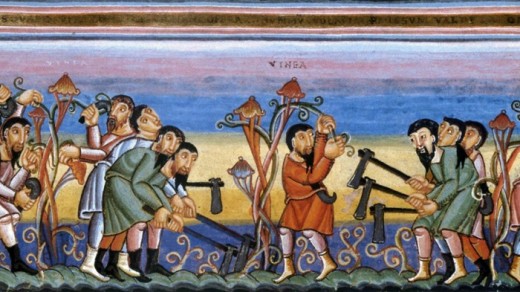Fair Pay for Hours Worked
Getting Personal With Christianity 6
Many times when we read the scriptures we focus on the traditional characters in parables. Parables are not meant to be taken to extremes. A bill before Congress regarding fair pay.
Democrats in the U.S. Congress introduced a bill on [January 30, 2019] to ensure equal pay for women and transparency from employers. The legislation would require employers to prove that current pay disparities between the sexes are job-related. [1]
Women are said to earn nationally $0.12 less for every dollar a man makes for doing the same job. Not taking this for another year, a disparity that should have ended "when John F. Kennedy signed the Equal Pay Act in 1963" but research shows otherwise. [2]
Fair pay is receiving wages for hours worked for the time worked. Is Jesus against fair wages? The prodigal son parable and the parables of the laborers are about lost souls returning to God and receiving the same blessing as all the other faithful followers. It is not about getting fair wages or about who served the longest. When we try to understand spiritual things with a temporal understanding it is foolishness.
In this article, try to look past the politics of the day and see the wages as the gift of forgiveness and salvation and not a wage disparity.

Parable of Workers in Field
Parables are meant to teach principles using common understanding of things. In Jesus's day, it was common knowledge that landowners hired out for labor and paid them for their work accordingly.
Jesus wanted to impress upon the minds of people that God is a rewarder of all them who follow Him no matter when they begin; the promise to them is the same as it was to the first.
Jesus taught:
For the kingdom of heaven is like unto a man that is an householder, which went out early in the morning to hire labourers into his vineyard. And when he had agreed with the labourers for a penny a day, he sent them into his vineyard. Matthew 20:1-2
From Matthew 20:1-15 Jesus explains the story of the vineyard. The householder went out several times collecting people who stood in the marketplace at differing hours of the day who needed work to do and informing them to go to the vineyard to work for a penny. When the day was over and all the work was completed the householder prepared to give all the workers in the vineyard what was due. As before mentioned, they were all promised a penny.
The very first workers did not know how much the householder had promised to pay the later workers. So "when the first came, they supposed that they should have received more." (Mathew 20:8) Of course, they had worked there all day in the vineyard and expected greater compensation. It did not happen. The first group of workers received a penny just like the group of workers who labored for one hour.
Jesus goes on to say that "they murmured against the goodman of the house, saying, 'These last have wrought but one hour and thou hast made them equal unto us, which have borne the burden and heat of the day." (Matthew 20:11-12)
Jesus said the householder responded, "Friend, I do thee no wrong: didst not thou agree with me for a penny? Take that thine is, and go thy way: I will give unto this last, even as unto thee. Is it not lawful for me to do what I will with mine own?" (Matthew 20:13-15)

Discuss
How fair is that!?
How is it fair that the people who worked only an hour can have the same pay as those who worked the entire day!?
Or, should I say:
How fair is it for a Christian who has only practiced for one year to get the same salvation as those practicing for 20 years?
- The householder (God) promised the first field-hands (Adam and Eve) a penny (salvation from death and eternal life) if they worked in the field (followed Jesus Christ and His teachings).
- The householder (God) promised each following group of field-hands (all of us) a penny (salvation from death and eternal life) if they (we) worked in the field, (follow Jesus Christ and his teachings).
Whether we deserve it or not, God will give us the same salvation as the first people if we will do His will. He is fair to all His children, not fair temporally, but ultimately.
To any person who was not ready to follow His teachings, the parable would be nothing of great measure. To those ready to follow Him and understand His words the parable was a promise, one that would give every person a chance to inherit eternal life.
Looking at the parable from a spiritual perspective takes away the appearance of inequity.
I know that if I worked for 8 hours at the same job as another person who worked only one and received the same pay I would not feel like it was fair. That is a worldly view of things. It is a good thing we have heaven's view.

Conclusion
- Scripture is not to be limited to temporal terms when we apply it to our daily lives because if the cultural reference was written long ago, it does not work well in many modern instances--i.e. most of us are not fishers or farmers, etc.
- Parables are timeless, but their temporal application may not be practical. Spiritual application brings insights.
- Just because we do not comprehend something--a teaching or parable--does not mean we question everything! Strengthen the things you already know and call upon the Lord for understanding and patients until He gives that extra knowledge.

Reference Resources
- Again, Bill to Ensure Equal Pay for Women Introduced in Congress [1]
Legislation would require employers to prove that current pay disparities between the sexes are job-related. - Equal Pay for Equal Work Bill | US House of Representatives: History, Art & Archives [2]
© 2018 Rodric Anthony Johnson







